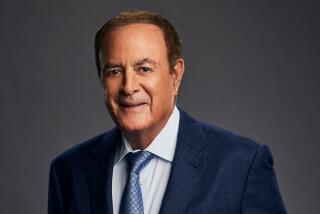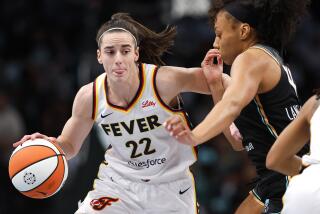Curt Gowdy Talks, and Writes, About His Favorite Era
Never again will a play-by-play announcer have his face and voice linked to as many major sporting events as Curt Gowdy did during the 1960s and ‘70s.
If it was big, Gowdy was there. He called 16 World Series, eight Super Bowls, 12 Rose Bowls and eight Olympics. He worked the Final Four and baseball All-Star games, college football and, back when there was such a thing, baseball’s “Game of the Week.”
He may be the only person in five sports halls of fame--the American Sportscasters Hall of Fame, the baseball Hall of Fame, the Sportswriters and Broadcasters Hall of Fame, the International Fishing Hall of Fame and the Oklahoma Sports Hall of Fame. He also won a Peabody Award for outstanding journalistic achievement.
For 20 years, he was host of “American Sportsman,” which won six Emmy Awards, and for a number of years he was the host of one of the best sports shows ever on television, “The Way It Was.”
The PBS series was produced by Gerry Gross, who says he will soon be making a comeback after a long battle with cancer. Gross lives in Indian Wells but plans to move back to Beverly Hills in September.
Gowdy, still active in broadcasting, lives in West Palm Beach, Fla., with Jerre, his wife of 44 years. He owns two radio stations there, two in Lawrence, Mass., near Boston, and two in Laramie, Wyo. His youngest son, Trevor, manages the Wyoming stations and his oldest son, Curt Jr., is one of the top producers at ABC sports.
Gowdy was in Los Angeles promoting a book he has written with John Powers of the Boston Globe. It’s called “Seasons to Remember: The Way It Was in American Sports (1945-1960)” and is published by HarperCollins of New York.
The book chronicles events and institutions during an era with which Gowdy is familiar. He covers the Glenn Davis-Doc Blanchard years at Army because he was then an announcer in Oklahoma. Gowdy also looks back at Oklahoma football. He was the Sooner announcer during the end of Jim Tatum’s reign and the beginning of Bud Wilkinson’s.
Hank Iba gets a chapter because Gowdy announced Oklahoma State basketball at the same time he did Oklahoma football, and because Gowdy, when he was a star player at Wyoming, played against Iba’s teams.
Gowdy writes about the Joe DiMaggio Yankees, since he was a Yankee announcer with Mel Allen in 1949 and ’50. The Boston Celtics and Red Auerbach get a chapter because Gowdy did the Celtics in 1951.
And much is written about Gowdy’s all-time favorite athlete, Ted Williams, since Gowdy was a Boston Red Sox announcer from 1951 through ‘65, and Williams was with the Red Sox until ’60.
Since his book doesn’t cover the years when Gowdy was NBC’s lead announcer, beginning in 1966, the obvious question is: Will there be a sequel?
“No, I don’t think so,” Gowdy said. “If I write another book, I’d like to write one on the ‘American Sportsman.’ I wrote about those years (1945-60) because those were the innocent years of sports.”
Those were the days before big-money pro contracts and the proliferation of sports on television, the days when people competed because they loved the game. Those were the days Gowdy remembers most fondly, and he believes readers of all ages want to know more about them.
*
This is Gowdy’s second book. His first, “Cowboy at the Mike,” published in 1966, was more autobiographical.
Gowdy said the reason he wrote a book at that stage of his career was so he could thank all the people who had helped him when a back ailment knocked him out of commission for all of 1957 and part of ’58.
He said, with his new book, he wanted to be less obtrusive, to keep himself out of it. That is admirable, but also unfortunate. Gowdy, a great storyteller, can sit for hours and talk about his career.
Over lunch the other day, he told about being hired by NBC in 1966 and how his good friend, Williams, almost became his broadcasting partner, a job that first went to Pee Wee Reese and then Sandy Koufax, followed by Tony Kubek.
“Ted said he would do it on two conditions,” Gowdy said. “One, he wanted to work with me. Two, he didn’t want to have to wear a tie.”
The problem was, Chrysler, a major sponsor, said that Williams had done a commercial for Ford. This was news to Williams, according to Gowdy.
“Turns out Ted had done a spot for Sears and, in the commercial, was a Ford station wagon. You could only see a small part of it.
“If it hadn’t been for that commercial, and if Gen. (William) Eckert (then the baseball commissioner) had not been afraid to get involved, Ted would have been a broadcaster. And a darn good one, too.”
TV-Radio Notes
NASCAR’s Miller Genuine Draft 500 at Pocono International Raceway, to be televised by TBS Sunday at 10 a.m., takes on added significance because of Davey Allison’s death in a helicopter crash at Talladega, Ala., this week. Much of the prerace coverage will be devoted to remembering Allison, and there will be a musical tribute at the end of the telecast. . . . TBS commentator Neil Bonnett, who will work the race, was the first person at the helicopter after it crashed. Bonnett was there to watch his son, David, test-drive a car, and Allison was coming to watch the test run, too. Bonnett, who is very close to the Allison family, considered not working Sunday’s telecast, out of respect for Davey. But Bobby Allison, Davey’s father, requested that Bonnett go ahead and do it.
Some recently uncovered golf footage will be shown during ABC’s British Open coverage this weekend. On Saturday, a one-minute piece will feature two former British Open champions, Willie Park Jr. and Willie Fernie, playing at Musselburgh, Scotland, in 1898. On Sunday, a three-to-four-minute segment shows Harry Vardon, a six-time British Open champion, and James Braid, who won it five times, playing at Edinburgh, Scotland, in 1904. . . . One interesting aspect is that golfers back then had to worry about stymies. If a ball was in your putting line, you had to hit around it. There was no such thing as marking a ball until the 1930s. The footage, believed to be the oldest on golf, was discovered by a collector in a Scottish junk shop. . . . The oldest sports footage is believed to be of a boxing match between Mike Leonard and Jack Cushing on June 24, 1894.
The “Jim Thorpe Pro Sports Awards” shown on ABC Monday night was fast-paced and well produced. One problem, however, was that it was easy to figure out most of the winners before they were announced because they were shown sitting in the audience. It became obvious that people such as Emmitt Smith, Riddick Bowe and Jim Courier wouldn’t have been there if they didn’t know they had won. . . . A highlight was former New York Jet defensive lineman Dennis Byrd, who won an award for courage. He was shown via satellite at his home in Tulsa, walking over to and sitting on a couch with his wife and children. The Byrds couldn’t be at the ceremony at the Wiltern Theatre in Los Angeles because of the birth of their second child, a daughter, two days earlier.
Tom Kelly and Al Bernstein will announce Saturday’s 6 p.m. pay-per-view fight card featuring Michael Carbajal against Korean Kwang-Sun Kim at Caesars Palace in Las Vegas. . . . “Naked Sports: Four Portraits” on Showtime Saturday at 10 p.m. focuses on a team owner, Marge Schott; a superstar, Michael Jordan; a promoter, Dan Duva, and a franchise, the Dallas Cowboys. . . . Sports wives will be featured on Irv Kaze’s KIEV show at 6:30 tonight. His guests will be Jo Lasorda, Karen West, wife of Jerry, Kathy Gott, wife of the Dodgers’ Jim, and Dainnese Gault, wife of the Raiders’ Willie.
The new ESPN2 cable network, scheduled to make its debut Oct. 1, a month earlier than originally planned, will use former Channel 2 sportscaster Keith Olbermann as its main anchor on its flagship program, “SportsNight,” on week nights, 5-8 p.m. . . . Jim Rome had an offer to work on the show but instead signed a new contract with XTRA. . . . The earlier launch of ESPN2 was prompted by the start of the NHL season, along with the benchmark dates established by the Cable Consumer Protection Act of 1992 for cable systems to set the rates they charge to subscribers, said Steve Bornstein, ESPN president.
More to Read
Go beyond the scoreboard
Get the latest on L.A.'s teams in the daily Sports Report newsletter.
You may occasionally receive promotional content from the Los Angeles Times.










